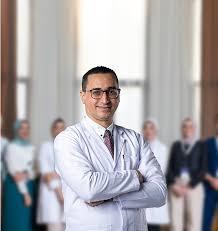Dr. Ahmed Adel
Geriatric Medicine Specialist

- Name: Dr. Ahmed Adel
- Phone: 010 10417010
- City: Cairo
- Area: Alf Maskan
Dr. Ahmed Adel
Geriatric Medicine Specialist
About Dr. Ahmed Adel:
Dr. Ahmed Adel is a prominent specialist in the field of geriatric medicine, possessing extensive experience in providing specialized healthcare for the elderly. He aims to enhance the quality of life of his patients through comprehensive and integrated care.
Academic Qualifications:
- Master's degree in Geriatric Medicine
- Advanced training in Elderly Health Management
Professional Experience:
- Worked in prestigious hospitals and clinics, providing specialized medical consultations for managing chronic diseases such as diabetes and heart conditions.
- Contributed to the development of treatment programs aimed at improving the mental and physical health of seniors.
Research and Achievements:
- Published scientific research related to elderly health in peer-reviewed journals.
- Delivered lectures at local and international conferences on the health challenges faced by seniors and strategies to address them.
Therapeutic Philosophy:
Dr. Ahmed believes in the importance of individualized care, focusing on meeting the unique needs of each patient and providing the necessary support. He strives to empower patients and their families to make informed health decisions.
Patient Communication:
For consultations or more information, you can contact [phone number] or visit [website]. Dr. Ahmed is dedicated to building trusting relationships with his patients to ensure the best possible healthcare.
Why Choose Dr. Ahmed Adel?
- Extensive Experience: Years of experience in geriatric medicine.
- Comprehensive Care: Integrated services that cover both medical and psychological aspects.
- Commitment to Quality: Improving the lives of seniors through personalized care.
Contact us today for a specialized medical consultation in elderly health!
FAQ
Geriatrics, or geriatric medicine, is a branch of medicine that focuses on the healthcare of elderly individuals. It involves the diagnosis, prevention, and treatment of diseases and conditions that affect older adults. This field addresses the physical and mental changes that come with aging and aims to improve quality of life and reduce the burden of disease. With the increasing elderly population in many countries, geriatrics is a crucial field that encompasses:
- Physical Care: Treatment of physical diseases such as heart diseases, diabetes, high blood pressure, and osteoporosis.
- Psychological and Cognitive Care: Management of depression, anxiety, and memory loss (such as Alzheimer's disease).
- Social Care: Addressing social issues such as isolation and loneliness.
The diseases that affect older adults are diverse, including many chronic conditions that impact various organs and systems:
- Heart Diseases: Such as high blood pressure, coronary artery disease, and heart failure. These conditions are among the leading causes of death in the elderly.
- Diabetes: Type 2 diabetes becomes more prevalent with age. This condition requires careful monitoring to manage blood sugar levels.
- Dementia and Alzheimer’s Disease: Dementia and memory loss lead to a gradual decline in the ability to think and make decisions.
- Arthritis and Osteoporosis: Joint and bone problems result in difficulty with movement and persistent pain.
- Depression and Anxiety: Depression is one of the most common psychological conditions among the elderly due to isolation and social circumstances.
Diagnosing diseases in the elderly requires a comprehensive examination that includes:
- Physical Assessment: This includes examining muscles and joints, blood pressure, heart rate, and lung function.
- Laboratory Tests: These tests include measuring blood sugar levels, cholesterol, liver and kidney functions, and other tests to diagnose chronic diseases.
- Imaging Tests: Such as X-rays, magnetic resonance imaging (MRI), or ultrasounds to identify problems with bones and joints.
- Psychological Assessment: Diagnosing depression, anxiety, and conducting memory tests to determine the presence of dementia or Alzheimer’s disease.
- Genetic Testing: In some cases, genetic testing may be required to determine genetic predisposition to certain diseases.
Improving the quality of life relies on providing comprehensive care that includes:
- Social Interaction: Engaging in social activities such as clubs or community gatherings reduces the risk of isolation and depression.
- Proper Nutrition: Providing a balanced diet that contains all the essential nutrients for the body's health.
- Physical Activities: Engaging in exercises like walking or swimming can improve muscle strength and joint mobility.
- Health Monitoring: Regular medical check-ups with specialists to slow the progression of diseases.
Chronic diseases in the elderly require comprehensive, multidisciplinary management:
- Medications: Adherence to daily treatment for conditions such as diabetes, high blood pressure, or heart disease.
- Dietary Adjustments: Modifying the diet to support treatment, such as reducing salt intake for individuals with high blood pressure.
- Physical Therapy: Regular exercise improves joint and muscle movement.
- Continuous Monitoring: Regular visits to healthcare providers to assess disease progression and adjust treatment as needed.
Social isolation can lead to a range of health problems:
- Depression and Anxiety: The feeling of isolation can contribute to psychological issues such as depression.
- Decline in Health: Isolation may lead to a lack of physical activity and participation in healthy activities.
- Chronic Diseases: Isolated individuals may ignore health symptoms or fail to seek necessary treatment in a timely manner.
The medications used in geriatrics vary based on the individual’s health condition and may include:
- Cardiovascular Medications: Such as antihypertensive drugs and blood thinners (e.g., aspirin).
- Diabetes Medications: Medications to regulate blood sugar levels, such as insulin or oral hypoglycemic agents.
- Pain Relievers: Such as non-steroidal anti-inflammatory drugs (NSAIDs) to treat joint pain.
- Psychiatric Medications: Such as antidepressants or anxiolytics to improve mental health in the elderly.
- Nutritional Supplements: Such as vitamin D, calcium, and omega-3 fatty acids.
